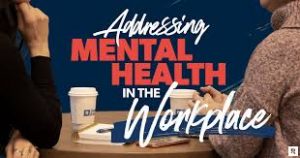Employee Mental Health

Do you own a small business?
How well do you know your employees? Can you tell when they’re not feeling 100% mentally or physically?
As much as you wish it weren’t the case – it’s part of your job to know what kind of shape your employees are in. It’s not so hard to tell if they aren’t well physically, but mentally? Even working side by side on a daily basis, you may not be able to pick up on mental distress, especially if the employee is determined to hide it. There are signs, though, and there are steps to take to make things better.
The International Foundation of Employee Benefit Plans article (https://blog.ifebp.org/signs-employee-mental-health) lists the following symptoms that can be observed at work:
- Increased emotionality, such as tears from someone who normally does not tend to cry
- Social withdrawal or conflict with others
- Increased missed appointments
- Appears tired or slow
- Looks confused at times and has a hard time making decisions
- Making more mistakes or lagging behind
- Increased conversations about problems
- Signs of alcohol or drug abuse
What can you, as the owner/boss, do to help when you do observe signs of mental distress? #1 – don’t diagnose and don’t judge. In the US, one in 5 of us meets the criteria for having a mental health condition.
In another article from the IFofEBP blogs (https://blog.ifebp.org/supervisors-support-employees-mental-health/) Tramaine ElAmin says “In terms of ongoing workplace strategies, providing a constant flow communication of information and addressing your workforce’s expressed concerns is recommended. Let your colleagues know that the work they are doing is of high value. As you recognize that everyone processes stress differently, let them know that it’s okay not to be okay and provide a safe environment for them to reach out. Avoid telling employees what they should do and instead ask what they need.” ElAmin also offers several tips on keeping a professional distance that can help you bridge the relationship between owner/boss and employee.
As the owner or the boss (or both!) you are close to your employees, but there needs to be a gap in diagnosing and treating your employee’s mental health issues. What do they need that you can provide and/or are required by law to provide? How will your other employees be impacted? The mental health of your employees is as important as their physical health and as a small business owner, it is in your best interest to monitor both.

